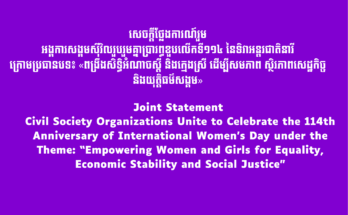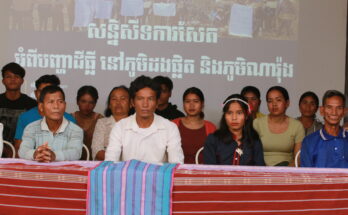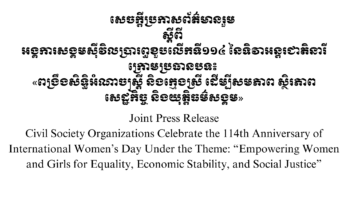Phnom Penh, 6 February 2012 ― The Cambodian Human Rights and Development Association (ADHOC) welcomes the arrest of two private security guards employed by TTY rubber company, who are suspected of having deliberately opened fire at unarmed villagers during a protest over a land dispute in Snoul district, Kratie province, on 18 January 2012.
On 4 February 2012, four days after Prime Minister Hun Sen “ordered” TTY Director to identify and turn in the suspects Kae Sovanna (41) and Pin Kimleng, a.k.a. Yun Chhaina (26), the two men were arrested by the police in Phnom Penh. The following day, they were sent to Kratie Court and officially charged with illegal use of weapons and intentional violence with aggravating circumstances, offenses punishable by two to five years in prison. They are currently being held in police custody while the case is examined by an investigating judge.
The shooting occurred while villagers were protesting against the destruction of farm lands by TTY rubber company bulldozers. Security guards opened fire as the villagers approached bulldozers to demand that the company stop clearing their cassava plantations. TTY, also known as Ornha Na Marady, was awarded an economic land concession amounting to 9,780 hectares by the Cambodian government, but a settlement with affected villagers was still under discussion when the shooting occurred. Four people were injured, including two seriously. One was sent to Vietnam to receive medical treatment. The government has pledged to cover the costs of medical treatment, but victims and their relatives are still awaiting compensation.
ADHOC is deeply concerned about several issues regarding this case. Firstly, it is a disturbing fact that the arrests took place only after “orders” were given to law enforcement and TTY officials by Mr. Hun Sen. Secondly, it is not clear whether the security guards acted upon their own initiative or were responding to orders. Thirdly, uncertainty remains over the exact role played by public authorities, in particular the police and provincial authorities, during the villagers’ demonstration; whether they too attempted to quell the protests unlawfully or whether they willingly allowed the shooting to take place.
ADHOC reminds law enforcement officials that they should carry out their duties, which include arresting persons suspected of committing criminal offenses, without waiting for public prompting from the executive. ADHOC further calls on the authorities to fully investigate the circumstances of the shooting. In particular, they should investigate the chain of command―that is, who gave the order to open fire, who provided the guards with AK47s, and whether the latter received training and legal authorization for carrying such arms. If other persons within TTY, including the company’s management and shareholders, are responsible for the use of firearms against villagers, they must be held accountable. Finally, ADHOC emphasizes that public authorities are under obligation not only to protect the right to peaceful protest of Cambodian citizens―guaranteed by the Cambodian Constitution and international human rights instruments to which Cambodia is a party―but to provide adequate protection for protesters against counter-demonstrators and other private parties, such as private security guards.
The act of violently quashing protesters is becoming increasingly common in Cambodia, where the police, military and security forces are often used to intimidate rather than protect Cambodian citizens. In the last decade protests have been cracked down in Banteay Meanchey, Preah Vihear, Battambang, Kampong Speu, Rattanakiri and Phnom Penh. Several demonstrators have been killed and wounded, while many have been arrested and detained. Consequently, ADHOC reiterates its call on the authorities to protect Cambodian people’s rights to adequate housing and to peaceful defense of their livelihoods; to ensure that evicted citizens obtain fair compensation; and to end impunity through holding human rights violators to account, regardless of their rank or social standing.
For more information, please contact Mr. Chan Soveth, Deputy Head of Monitoring Section at ADHOC: 016 937 591



